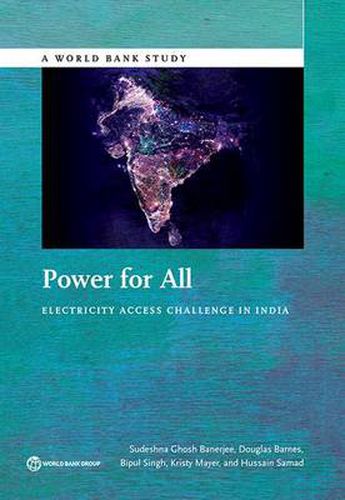Readings Newsletter
Become a Readings Member to make your shopping experience even easier.
Sign in or sign up for free!
You’re not far away from qualifying for FREE standard shipping within Australia
You’ve qualified for FREE standard shipping within Australia
The cart is loading…






India is a leading developing country in providing electricity to rural and urban populations. By late 2012, the national electricity grid had reached 92 percent of India’s rural villages, or about 880 million people. Yet, approximately 311 million people - mostly those in rural areas - still live without electricity. Less than half of all households in the poorest income group have electricity. Even among households with electricity, hundreds of millions lack reliable supply and experience power cuts almost daily. Achieving universal access to electricity by 2030 is not financially prohibitive for India. The challenge of providing electricity for all is achievable, ensuring that India joins such countries as China and Brazil in reaching out to even its remotest populations. Policies will need to be aligned with the principles followed in other successful international programs. The potential benefits of electrification for those without service are quite high. The benefits of lighting alone would approximately equal the investments necessary to extend electricity for all. Households with electricity consume more than 100 times as much light as do households with kerosene for about the same amount of money. Without quality energy services, households often face entrenched poverty, poor delivery of social services, and limited opportunities for women and girls. This book will be of interest to a wide audience, including policy makers, experts and managers in the international development community, and those in academia.
$9.00 standard shipping within Australia
FREE standard shipping within Australia for orders over $100.00
Express & International shipping calculated at checkout
India is a leading developing country in providing electricity to rural and urban populations. By late 2012, the national electricity grid had reached 92 percent of India’s rural villages, or about 880 million people. Yet, approximately 311 million people - mostly those in rural areas - still live without electricity. Less than half of all households in the poorest income group have electricity. Even among households with electricity, hundreds of millions lack reliable supply and experience power cuts almost daily. Achieving universal access to electricity by 2030 is not financially prohibitive for India. The challenge of providing electricity for all is achievable, ensuring that India joins such countries as China and Brazil in reaching out to even its remotest populations. Policies will need to be aligned with the principles followed in other successful international programs. The potential benefits of electrification for those without service are quite high. The benefits of lighting alone would approximately equal the investments necessary to extend electricity for all. Households with electricity consume more than 100 times as much light as do households with kerosene for about the same amount of money. Without quality energy services, households often face entrenched poverty, poor delivery of social services, and limited opportunities for women and girls. This book will be of interest to a wide audience, including policy makers, experts and managers in the international development community, and those in academia.